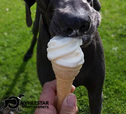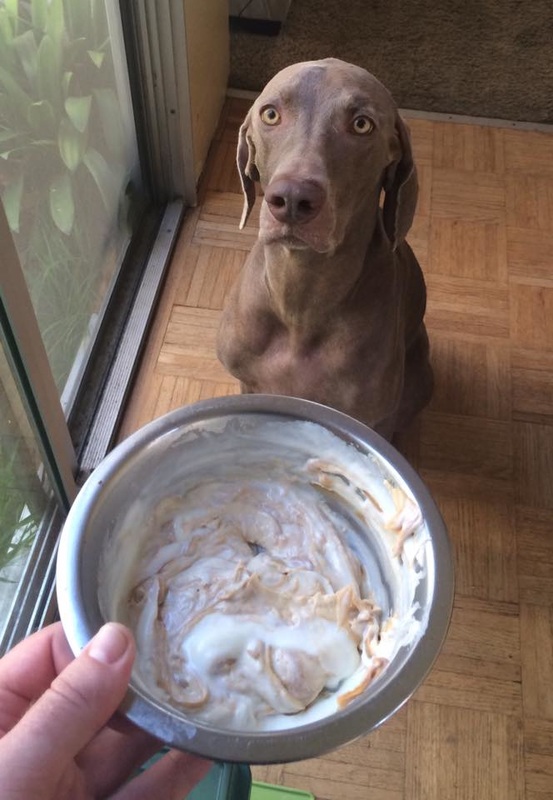Snacks & Treats

Praise is a Great Reward
The Weimaraner favors kisses, attention, snuggling, and being the center of your universe. It is a well-known fact that the Weimaraner would crawl under your skin if it were possible. Lavishing them with praise is (more often than not) the best possible reward. Enticement (other than praise) for every compliance is best avoided. Nonetheless, snacks and treats have their place.
Use Treats Correctly
The food-driven Weimaraner does benefit from the occasional enticement or reward during training and at other times. In truth, we humans delight in giving them a special morsel. Nevertheless, remember to keep this reward at your discretion. Try to remember to make every effort not to set the treat as the automatic reward for compliance or for them doing something cute. The Weim, who gets the idea, they deserve the treat for doing what is expected may soon place you in a checkmate situation that is a huge loss for them. You don't want them ignoring your command and walking out into traffic. It is never a good idea for the Weimaraner to get the idea they running things. The paws up approach (meaning the Weimaraner is in control) will lead to nothing good.
Treats and Snacks count as Food
We realize how hard it is to stay out of the temptation of giving too many treats and letting the Weimaraner run things. This is an ongoing tug-of-war between doing what is the best and getting duped by the manipulative and cunning Weimaraner. Treats and snacks are add-ins to the Weimaraner diet. They count as part of the day's food. Remember if you are feeding them 3 cups of kibble food a day and you give them another cup of treats it is easy to put on extra weight.
The Weimaraner favors kisses, attention, snuggling, and being the center of your universe. It is a well-known fact that the Weimaraner would crawl under your skin if it were possible. Lavishing them with praise is (more often than not) the best possible reward. Enticement (other than praise) for every compliance is best avoided. Nonetheless, snacks and treats have their place.
Use Treats Correctly
The food-driven Weimaraner does benefit from the occasional enticement or reward during training and at other times. In truth, we humans delight in giving them a special morsel. Nevertheless, remember to keep this reward at your discretion. Try to remember to make every effort not to set the treat as the automatic reward for compliance or for them doing something cute. The Weim, who gets the idea, they deserve the treat for doing what is expected may soon place you in a checkmate situation that is a huge loss for them. You don't want them ignoring your command and walking out into traffic. It is never a good idea for the Weimaraner to get the idea they running things. The paws up approach (meaning the Weimaraner is in control) will lead to nothing good.
Treats and Snacks count as Food
We realize how hard it is to stay out of the temptation of giving too many treats and letting the Weimaraner run things. This is an ongoing tug-of-war between doing what is the best and getting duped by the manipulative and cunning Weimaraner. Treats and snacks are add-ins to the Weimaraner diet. They count as part of the day's food. Remember if you are feeding them 3 cups of kibble food a day and you give them another cup of treats it is easy to put on extra weight.
Americans seem to be obsessed with giving treats to their pets. The Weim owner is no exception. This being said, an overweight Weimaraner is not a good thing. Pat Hastings, Dog Folk Enterprises, says that for every five pounds of extra weight, your dog carries, you lose one year of togetherness. Healthy Snacks are Important
Here are some ideas in no specific order!
It is perfectly Ok to share some people food on occasion. This can include a variety of things--some of which we do not eat ourselves.
Disclaimer: Information published on this website is intended for reference use only. The only clear option for ensuring your pet’s health is to feed commercial grade dog foods and treats only. Feeding human foods of any sort carries some degree of risk and is not under the control of this website.
|
Other Thoughts to Keep In Mind
Old food – You don’t like old and moldy food, so what makes you think your dog will? The bacteria in spoiled food contains all sorts of toxins that can be damaging to your dog’s health. Feed them the freshest and best, dog-approved food only! Leftovers – I know it’s difficult to keep your dog from feasting on your dinner left overs after they’ve had to sit there and watch you eat it all in front of them. But the fact is that if you feed them leftovers regularly they won’t be getting a proper diet. If you do give them table scraps, make sure to take out any bones and trim down the fat. Check the ingredients – Bottom line is be sure to know what’s in the food you’re giving your dog. The items from the list above should definitely not be on there. You’d be surprised at how many foods contain sugar and caffeine, that you wouldn’t expect to without first checking the ingredient list. Human snacks – Chips can contain garlic and onion powder, cookies may contain raisins, chocolate or macadamia nuts, etc. Bottom line – there’s a reason there’s food and treats made especially for dogs. |

